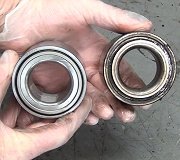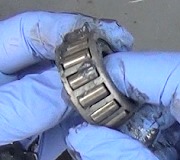Bleeding is absolutely not the problem. Air in the hydraulic system is bad because it compresses and will not transfer your brake pedal pressure to the brakes. That results in a low and mushy pedal will poor stopping power. You have exactly the opposite.
The common cause of what you're describing is a constricted front rubber flex hose. As soon as you feel the brake locking up, you should stop trying to force the car to move. You're causing damage to the brake pads and rotor. What is happening is due the restriction in the line, brake fluid is hard to push through it. That is why your brake pedal is high and hard. Once you DO get a little fluid through it and the brake applies, that fluid can't release back to the reservoir, so that brake stays applied and gets hot. The heat causes the brake fluid to expand, and that applies that brake even harder.
The way to find this is as soon as you feel the car is slowing down, stop on a slight incline, shift to neutral, place a block about a foot downhill of one tire so you don't look funny running after the car, then open the hydraulic system at various places to see where the brake fluid is being trapped. The easiest place to start is by loosening the steel lines at the master cylinder. If you get a tiny spurt of brake fluid and the brake releases, we gotta talk, because that can have a real expensive cause and repair. Most commonly the brake won't release, so tighten those lines, then open the bleeder screw on the sticking caliper. If that releases the brake, that's proof the caliper is not the cause. The rubber flex hose is the main suspect.
Thursday, November 5th, 2015 AT 2:18 PM


